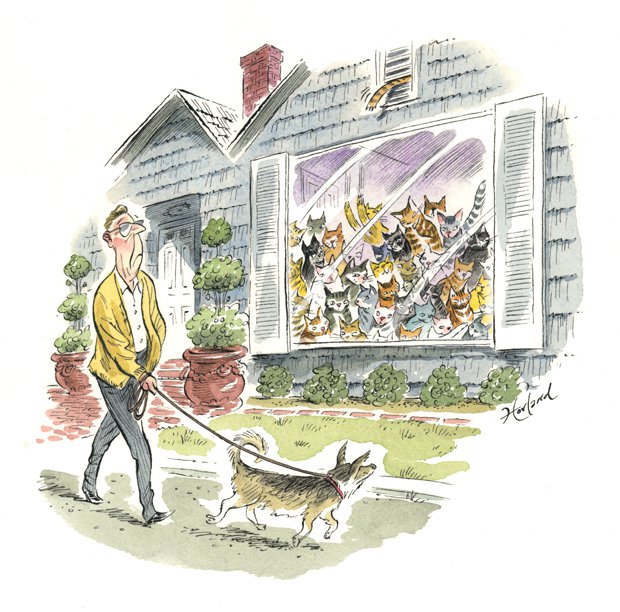Cat obsession causes civic unrest.

Cat obsession causes civic unrest.
Even Facebook-deniers know the social networking service is 95 percent about cats. People have one cat to keep them company, two cats so they can keep each other company, three because they didn’t want to break up a litter, four .… well, these folks escalate, from cat owner to cat person and finally to crazy cat person, sometimes further.
In 1988, the fur was flying in Chesterfield County as some residents carped to the board of supervisors about their multi-catted neighbors, charging that their excessive number of felines was not just pesky, but downright destructive.
“One of the complaints involves a whole lot of cats,” said Supervisor Maurice Sullivan, representing Midlothian District, “more than a dozen.” Chesterfield had a law limiting to three the number of dogs allowed per household but put no ceiling on cats. The supervisors were considering one.
In an article about this “Noah’s ark” proposal, the Chesterfield Gazette recalled the board’s attempt the year before to pass the “now-famous chicken ordinance,” under which owners would have had to pay a fine for poultry-perpetrated damage to neighbors’ property. The biddy bill laid an egg, but the cat issue seemed to have more oomph, so the supervisors scheduled a public hearing in September. Harry Daniel, of Dale District, expected the hearing to be both “interesting” and helpful. Some of his best friends were cat owners, but things do sometimes get out of hand, he admitted. Not surprisingly, Jesse Mayes, author of the anti-chicken ordinance, was all for cat limits. “A neighbor has a right,” he said.
And such neighbors were seeking to codify that right. “Most people have agreed, you have to do something,” Sullivan said. His proposed ordinance, which did not pass, would have allowed a household to possess five or six cats, or more with a permit. While it’s hard to imagine living with 12 felines, “a person could have 100,” Sullivan said.
Yes, they could, and do. And, of course, today there’s a buzzword for this: animal hoarding. Too often, this boils down to animal abuse, despite intentions that are usually good. Two years ago, Fairfax County animal-control officers removed more than 160 cats from an Annandale house after neighbors complained about the stench, D.C.’s CBS affiliate WUSA reported on its website. At first, the two cat ladies simply offered a haven to rescues, and on weekends, they’d take their charges to a pet store to try to get people to adopt them. But things snowballed. People began bringing cats to the ladies—one of the women gained a rep as a “kitten whisperer.” She evidently whispered too much: One woman drove all the way from Florida with five kittens for them.
The Annandale cats had done heavy damage to the house. Anything that was porous had to be ripped out and replaced. The house was later sold, though below market value. For the cats, the story had a happier ending. The women had taken “really good care” of them, a neighbor said. Just one dead animal was found, and all had been neutered and vaccinated. And with the help of businesses, the NoVa cats and kittens were put up for adoption. In the end, the Chesterfield dozen was small potatoes.
Stumping for a Dry Shore — 1913
The teetotaling attendees at the convention of the Woman’s Christian Temperance Union of Accomack and Northampton counties pass a resolution to “move forward with firmer faith and renewed energy to ‘possess the land,’” quotes Accomac’s Peninsula Enterprise. Championing legislated prohibition, they demand that Virginia “forever” bar the manufacture and sale of “intoxicating liquor.” An editorial in the same edition of the Enterprise is a screed against suffrage in “the home of Washington and Jefferson.” Perhaps the editor, certainly less lovely, is also less temperate than these prohibitive ladies.
Chilling on His Mower — 1938
Richmonder W.L. Gibbs turns his ingenuity to the unappealing problem of cutting his “over-abundant” grass, reports the Greene County Record. Gibbs wrenches his mower to pieces, jettisons the heavy gears, rigs a pulley onto the blade shaft and mounts a small but powerful electric motor onto the chassis, connecting it by a long cord to an outlet at the house. He adds an electric fan to the rig that “directs a stream of cool air” at the operator. Now he “mows blithely along in an effortless, ‘air-conditioned’ atmosphere” as his neighbors “perspire and groan” over their mowers. This will surely catch on.
A Pachyderm with a Twist — 1963
As the Twist sweeps the country as fast as the Hula-Hoop did a few years ago, the Northampton Times wonders, “How big can it get?” The answer: bigger than Chubby Checker. The centerpiece of the “Children’s Fun-Day” to be held at Cape Charles High School in October is Jewel, a teenage elephant that, when she hears Checker intoning “Let’s Twist Again,” “tosses her trunk in the air, sets her 3 tons of avoid du pois [sic] in motion,” and commences to twisting so avidly that she’ll “shake and rattle [if not roll] window panes for a block around.”








